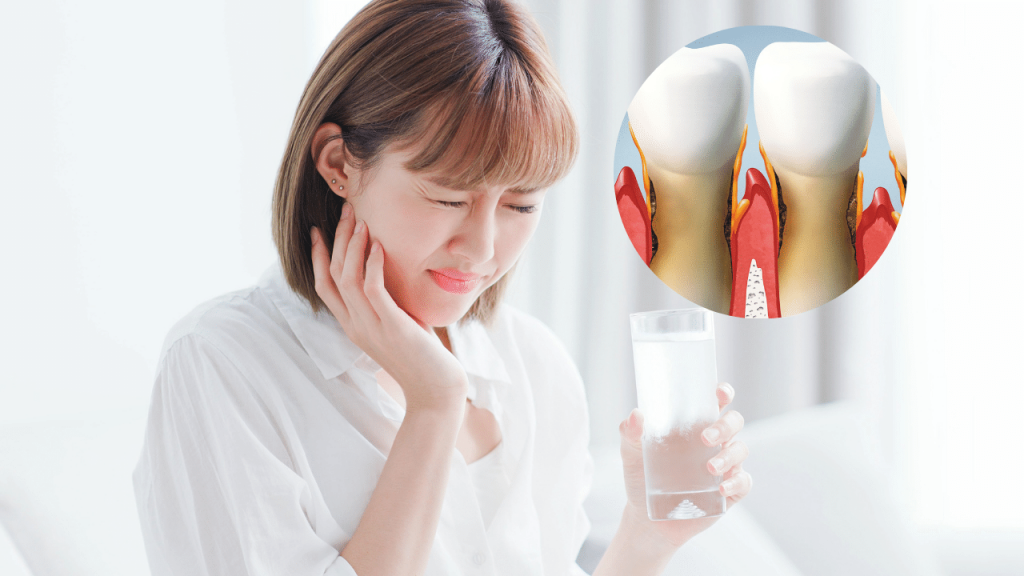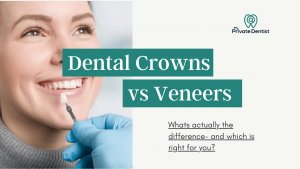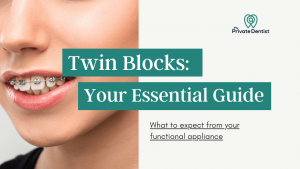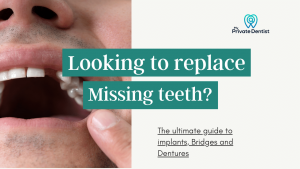Here are my recommendations for the best toothpaste for receding gums.
If you’re dealing with receding gums, you may have noticed your gum line has dropped in height, and teeth appear longer. As the gums shrink away, the roots of teeth can become exposed. This can cause sensitivity, making it uncomfortable to eat or drink hot, cold or sweet things.

If you’re worried that your gums are receding, you should check in with your dentist. Common causes of receding gums include gum disease, overzealous brushing and trauma to the gums. It’s important to understand what is causing your gum recession, so that you can have the correct treatment, and take steps to prevent it from worsening.
For healthy gums, it is essential to have a regular oral hygiene routine, including twice daily brushing with a fluoride toothpaste. As a dentist, I commonly get asked ‘What is the best toothpaste for receding gums?’
If you have receding gums, you need a toothpaste that will promote healthy gums, is gentle and not too abrasive, and will treat sensitivity.
Considering these 3 key criteria, I find Colgate Sensitive Instant Relief to be the overall best toothpaste for receding gums. It has anti-gingivitis properties, a very low abrasive score and contains the active ingredient arginine to relieve sensitivity.
But Colgate Sensitive isnt the only toothpaste that works well for receding gums. There are several effective ingredients that may suit you individually. In this article, I will offer my recommendations for the best toothpaste for receding gums in 2024, so that you can find the right one for you.
Our Top 4 Picks
Best overall toothpaste for receding gums Colgate Sensitive Instant Relief
Best toothpaste for gum health Corsodyl Gum + Breath and Sensitivity
Best toothpaste for sensitivity Sensodyne Repair and Protect
Best short term use toothpaste for receding gums. Curaprox Support +
How we tested products to find the best toothpaste for receding gums
To find our top recommendations for toothpaste that helps with receding gums, we looked at the commonly available toothpastes on the market targeted for gum health. We considered clinical research and assessed each product for:
- Active ingredient effectiveness
- Gum health improvement
- Sensitivity reduction
- Flavour and texture
- Price
Why trust us? After helping thousands of patients over the last 10 years, we know what works. We tell you what the gimmicks are, so you can get the best advice and products that are truly value for money.
Our Top Picks
Best Overall Toothpaste
Colgate Sensitive Instant Relief Repair + Gum Care
Why Our Dentists Like It
Colgate Sensitive Instant Relief is a great all round toothpaste to help treat and prevent receding gums. Packed with key active ingredients, it’s tough on plaque bacteria, gentle on fragile gums, and relieves sensitivity quickly and effectively.
The key ingredients zinc oxide, sodium fluoride (1450ppm) and arginine, have been clinically proven to work together to provide long lasting antibacterial protection for healthy gums and the whole mouth[1]. By drastically reducing oral bacteria levels, the main cause of gum disease, this toothpaste reduces gum inflammation and recession.
When your gums recede, it can lead to painful sensitivity from exposed tooth roots. Thanks to its unique pro-argin formulation, Colgate Sensitive Instant Relief toothpaste provides immediate relief by creating a protective layer over these exposed areas [2]. Just apply a small amount directly to sensitive teeth and gently massage for one minute, up to twice a day.
By using this toothpaste regularly, you’ll maintain a lasting barrier against discomfort and prevent sensitivity from returning for up to 8 weeks.
Best Toothpaste For Gum Health
Corsodyl Gum + Breath and Sensitivity
Why Our Dentists Like It
Corsodyl mouthwash is well known for its effectiveness in treating gum disease. Their toothpastes work well too, but patients sometimes struggle with the taste. We like the new Corsodyl Gum + Breath and Sensitivity toothpaste, as not only is it great for promoting healthy gums, the peppermint and sweet spearmint flavour tastes good too.
When used twice daily, It has been clinically proven to target gum problems that cause recession AND protect sensitive teeth.
Corsodyl Gum + is a top choice because it contains stannous fluoride and zinc chloride: two hard working antibacterial and antiplaque ingredients. These active antiseptic ingredients target harmful bacteria in the mouth, preventing plaque and calculus buildup—the primary culprits behind gum disease. By controlling bacteria levels, they helps maintain healthy gums, which are less likely to recede.
Stannous fluoride is also key in helping combat tooth sensitivity. It forms a protective layer around exposed dentine, shielding it from hot and cold sensations.
Corsodyl Gum + toothpaste targets plaque bacteria deep within teeth, prevents sensitivity and even tackles bad breath, making it a great option for every day use.
Best For Sensitivity
Sensodyne Repair and Protect
Why Our Dentists Like It
We recommend Sensodyne Repair and Protect for patients that struggle with painful sensitivity. Designed for twice daily use, it also contains the dentist recommended fluoride concentration of 1450ppm for everyday cavity protection.
Sensodyne Repair and Protect is backed by clinical evidence for quick and effective relief from sensitivity, and provides daily protection for sensitive teeth. It is powered by NovaMin Technology, or calcium sodium phosphosilicate, which has proven remineralisation potential of tooth surfaces. This means it works deep within the dentine to actively repair and build a protective mineral layer over exposed areas, for long lasting sensitivity relief.
Best Short Term Use Toothpaste For Receding Gums
Curaprox PerioPlus Gum Support
Why Our Dentists Like It
We recommend Curaprox PerioPlus+ Support Toothpaste as a short term toothpaste for people with advanced gum disease and receding gums. To read more about it’s benefits for advanced gum disease, click here. While it has less fluoride than I would advise for daily use, it’s very effective for treating and preventing advanced gum problems.
Curaprox PerioPlus+ includes chlorhexidine digluconate (CHX), which is a strong antibacterial that reduces plaque bacteria in the mouth, improving gum health. CHX is not typically found in toothpastes but is often used in mouthwashes like Corsodyl.
Advanced gum disease can cause sensitivity and discomfort. This toothpaste is gentle for sensitive gums because it’s non-mint and doesn’t contain sodium lauryl sulfate (SLS), which can irritate some people.
The toothpaste also has hyaluronic acid to repair and protect gum tissue and reduce inflammation.
Buying Guide
Dealing with receding gums can be a worry. Gums can feel fragile and sensitive, and there is a fear of potential tooth loss. With so many toothpaste options claiming to improve gum health, it’s important to choose the right one for you.
Here’s what to look for in the best toothpaste for receding gums:
- Promotes healthy gums and prevents recession: Look for active ingredients like stannous fluoride, a strong antibacterial and anti-sensitivity agent, and hyaluronic acid, which supports gum health and regeneration
- Gentle on gums, not abrasive: Avoid abrasive toothpastes, such as gritty whitening ones, that can further irritate or damage receding gums. Avoid toothpastes with harsh ingredients like sodium lauryl sulfate (SLS), which can cause irritation for some people.
- Combats sensitivity: Receding gums often lead to increased tooth sensitivity. Look for toothpastes formulated to combat sensitivity, containing ingredients like potassium nitrate or stannous fluoride, which help desensitise nerves and reduce sensitivity.
In this buying guide, I will walk you through what you should be looking for in the best toothpaste for receding gums. We will look at the key ingredients that will promote healthy gums, and which ingredients to avoid.
Why Do I Have Receding Gums?
The first step is understanding why your gums are receding. Possible reasons include:
- Brushing too aggressively, which can wear away gums and the outer enamel layer of your teeth.
- Having an inadequate oral cleaning routine leading to unhealthy gums or gum disease.
- Having naturally thin gum tissue (thin biotype), making them more prone to recession.
- Undergoing orthodontic brace treatment, especially as an adult.
- Sustaining trauma to your gums or teeth.
It’s important to visit your dentist to determine the cause of your receding gums and what preventive measures can be taken. Depending on the cause, your dentist can assess whether the issue is still active or likely to worsen.
NOTE
Certain people have some risk factors for developing gum disease and subsequent recession. Some common ones include:
- Ineffective oral cleaning
- Smoking
- Uncontrolled diabetes
- Stress
- Pregnancy
Despite the cause of your gum recession, it is important to make sure you have an excellent oral cleaning technique to maintain healthy gums. This means:
- An excellent brushing technique
- Regular dental check ups
If gum disease is caused by inefficient cleaning, bacteria in plaque accumulates around the gum line causing bleeding and inflammation over time. As gum disease progresses, it can cause damage to underlying bone causing bone levels to drop. Then gums follow, causing gum recession.
Unfortunately, once gum levels have decreased, they cannot grow back naturally, and repairing them is challenging for dentists. In some cases, a gum specialist or periodontist may consider surgical options like a gum graft to replace lost gum tissue, but this is complex and not suitable for every situation. You can find a gum specialist by clicking here.
Oral Hygiene Advice If You Have Receding Gums
For healthy teeth and gums, it’s essential to have an effective oral hygiene routine. This means brushing twice a day for 2 minutes with an electric toothbrush and a fluoride toothpaste, keeping the brush focused along the gum margin. It is also important to use interdental aids, such as floss, regularly too. If you have receding gums, you should take extra care.
- Get used to flossing: Use interdental aids every day to clean tight spaces between teeth. You can use flossettes, interdental brushes, or water flossers to clean between your teeth.
- Unveil the plaque with disclosing tablets: Pop a small purple disclosing tablet into your mouth, chew it, and swish it around. This tablet will dye any plaque, making it easier to spot and remove. You can use it before or after brushing to ensure you haven’t missed any plaque.
- Embrace the power of fluoride: Use a pea-sized amount of toothpaste containing fluoride (for kids under 6, a smear will do) on a wet electric toothbrush.
- Time for two-minutes: Brush your teeth for a full two minutes, twice a day. Focus on the gum line, where the tooth meets the gum, and make sure you cover all surfaces of your teeth (front, back, and biting surfaces).
- To prevent making receding gums worse, Avoid brushing too hard: Aggressive brushing at the gum line can wear away your gums and enamel, leading to further recession and sensitivity. Consider investing in an electric toothbrush with a pressure sensor that alerts you if you’re applying too much force.
- Use an electric toothbrush with soft or medium bristles: Avoid brushes with hard bristles.
- Steer clear of gritty or abrasive toothpastes, such as whitening or charcoal formulas. These can be too harsh for your gums and contribute to further damage. Choose toothpastes specifically designed for sensitive gums and enamel protection.
- Spit, don’t rinse: After brushing, spit out the excess toothpaste, but skip the rinsing. This allows the active ingredients in the toothpaste to keep working. Think of it like applying a nourishing moisturiser and leaving it on for maximum benefit.
- Freshen up with an antibacterial mouthwash: Use an alcohol-free mouthwash containing fluoride for an extra boost. Swish it around your mouth at a different time from brushing to keep your breath fresh.
- Schedule regular dental visits: Make sure to visit a dentist or hygienist for personalised advice
What To Look For In The Best Toothpaste For Receding Gums
Use a fluoride based toothpaste
You should always use a toothpaste that contains fluoride. Fluoride plays an important role in preventing tooth decay and gum disease.
Look for toothpaste containing 1000-1450 ppm (parts per million) fluoride. This is widely available, and most toothpastes bought in supermarkets contain fluoride, though not all so it is important to check.
Fluoride is added to toothpaste in two forms: Sodium Fluoride or Stannous Fluoride.
Stannous Fluoride
In the form of stannous fluoride, it has additional properties that make it an essential ingredient in a toothpaste for gingivitis.
Stannous fluoride is antibacterial meaning that it can stop the growth of bacteria in plaque- the main cause of gingivitis, and bad breath. By reducing the amount of bacteria in the mouth, stannous fluoride promotes a healthier mouth.
It also prevents the formation of plaque in your mouth, making it easier to remove through regular brushing and flossing.
Stannous fluoride can help with tooth sensitivity too.
Experiencing sensitivity
If you have receding gums you may experience sensitivity with fluctuations of temperature, such as hot and cold. This is because as your gum levels drop, tooth roots become exposed, and is no longer protected/covered by gum tissue. Tooth root does not have a hard protective enamel layer, and instead has dentine/cementum. Dentine has tiny holes/tubules which, when exposed to a temperature change, cause a painful nerve response.
A ‘sensitive’ toothpaste contains special ingredients in their formulation that either block pain signals or repair and protect sensitive areas.
Common anti-sensitivity ingredients to look for are:
Potassium Nitrate: This ingredient helps to desensitize the nerves in the teeth by blocking the transmission of pain signals. It is one of the most widely used ingredients for sensitivity relief. Can take 2-3 weeks for noticeable effects
Found in Sensodyne Pronamel Intensive Repair
Stannous Fluoride: Stannous fluoride not only helps to strengthen tooth enamel and protect against cavities but also provides sensitivity relief by blocking the exposed dentin tubules. It forms a protective barrier over the sensitive areas of the teeth, reducing the transmission of stimuli that cause sensitivity.
Found in Corsodyl Gum + Breath and Sensitivity
Strontium Chloride: Strontium chloride works similarly to potassium nitrate by desensitizing the nerves in the teeth and reducing sensitivity. It is less commonly used compared to potassium nitrate.
Calcium Sodium Phosphosilicate (Novamin): Novamin works by forming a protective layer over exposed dentin tubules, which are microscopic channels that connect the inner part of the tooth (dentin) to the nerve endings. It helps to seal these tubules, reducing the transmission of stimuli that cause sensitivity and promoting repair of sensitive areas of the teeth.
Found in Sensodyne Repair and Protect
Arginine: Arginine, often combined with calcium carbonate, has been shown to effectively block dentin tubules and reduce sensitivity by sealing exposed dentin surfaces. It promotes the formation of a protective layer on the teeth, reducing the perception of pain or discomfort associated with sensitivity.
Found in Colgate Sensitive Instant Relief
They all work well, though studies suggest that NovaMin containing toothpastes may be the quickest relief from sensitivity [3]. The ‘best’ option depends on personal preference, and how well your teeth respond to each active ingredient.
Your dentist may prescribe a high fluoride toothpaste at a concentration of 28000 for age 10-15 and 5000ppm for 16+. Commonly sold as duraphat, this high levels of fluoride are higher than what you can buy from a supermarket It is very effective at strengthen the outer layer of enamel and therefore reduces sensitivity.
Tips For Success With Sensitive Toothpaste
Sensitive toothpastes work by forming a protective barrier around the root surfaces, essentially blocking the little holes. This stops the nerve from reacting and causing pain
For best results:
- You need to continue using sensitive toothpastes for it to work. The protective barrier will quickly degrade if you stop using sensitive toothpaste.
- Do not rinse your mouth after brushing. If you rinse your mouth, the toothpaste cannot develop the protective layer as you would have washed it away.
- Smear a small amount of toothpaste on the sensitive area for quick relief: some toothpastes offer relief within 3 days (sensodyne rapid relief)
- Can take about 2 weeks for it to be most effective
- Some people have a sensitivity to sodium lauryl sulphate (SLS) based toothpastes.
- Always visit your dentist regularly. It’s important to diagnose your gum condition accurately.
FAQs
How can your dentist treat receding gums?
Your dentist will assess the underlying cause of your receding gums, and establish whether the issue is ongoing, or likely to progress. They will advise on any improvement in oral hygiene technique needed if gums are unhealthy. If you’re struggling with sensitivity, they may apply a desensitising agent, such as fluoride varnish or prescribe a high fluoride toothpaste. In some cases, a periodontist (gum specialist) may suggest a surgical procedure such as a gingival graft to help treat gum recession.
Can salt water help with gum disease?
Salt water can be used to help soothe sore gums, but it cannot cure gum disease alone, but it can help to soothe gums. Dentists often advise salt water rinsing after an extraction, as it has mild antibacterial properties to speed up wound healing and reduce inflammation.
What is the best mouthwash for gum disease?
The best mouthwash for gum disease should work to specifically target plaque causing bacteria. Consider an antiseptic mouthwash such as corsodyl for short term use to treat active gum disease, or a plaque inhibiting/preventative mouthwash for daily protection to keep gingivitis at bay.
I recommend Vitis Gingival as a great daily mouthwash for gum disease, because of its gentle formulation and key anti-gingivitis ingredients. To learn more, check out my article on best mouthwash for gingivitis.
What is the best toothpaste for gum disease?
When looking for a toothpaste for treating and preventing gingivitis, there are some key active ingredients that you should look for. These ingredients include stannous fluoride, xylitol and zinc citrate, and they work to improve inflamed gums and prevent plaque build up. I recommend Oral B Pro Expert Deep Clean Toothpaste as the best toothpaste for gum disease because of its key antigingivitis ingredients. If used twice daily, IT can prevent sore, swollen gums caused by gum disease. Read my article reviewing toothpastes for gum disease.
What about whitening if I have receding gums?
You should avoid whitening your teeth with products that contain bleaching agents such as hydrogen peroxide if you have gum disease, as this can make it sensitivity worse. ‘Whitening’ toothpastes targeted to those with sensitive or receding gums may contain mild abrasives, such as calcium carbonate, to remove surface stain. These should be safe to use, but should be used with caution if you tend to brush your gums vigorously.
Our Verdict
If you have receding gums, it’s a good idea to make sure your tooth brushing routine is regular and effective.
Using a specific toothpaste for gum health can help to reduce bacteria and plaque build up, and improve sensitivity- one of the main causes of symtomss of gum recession.
The best toothpaste for receding gums should:
- Not be abrasive/gritty
- Target gingivitis-causing bacteria
- Combat sensitivity
We recommend Colgate Sensitive Instant Relief as the best overall toothpaste for gum recession, as its gentle enough for daily use, promotes gum health and tackles sensitivity. Sodium fluoride and zinc oxide work to protect gums and prevent recession, and the cleve pro-argin technology immediately relieves sensitivity.








